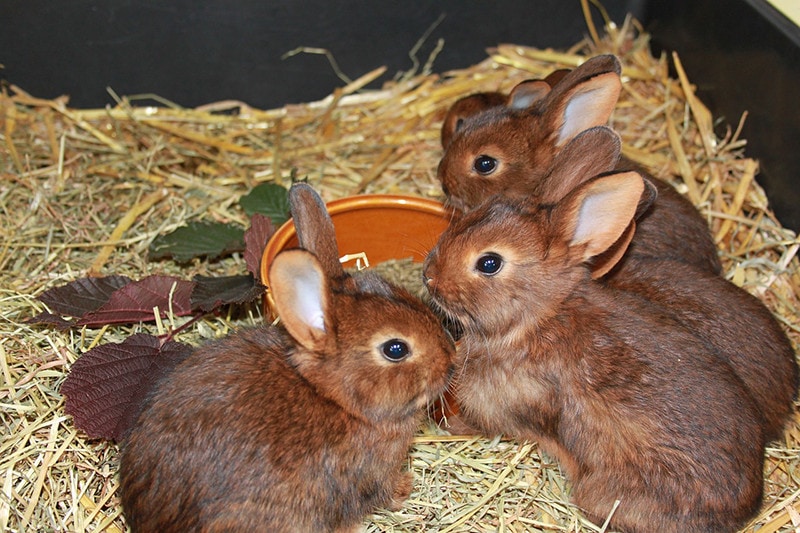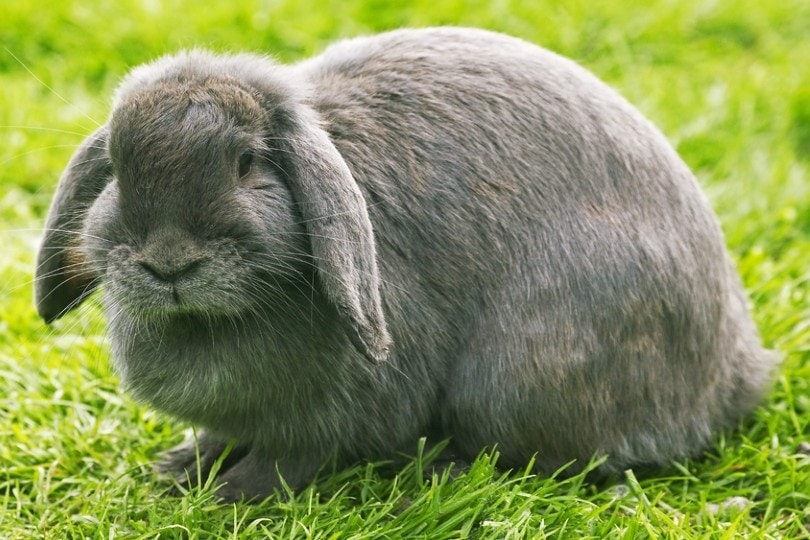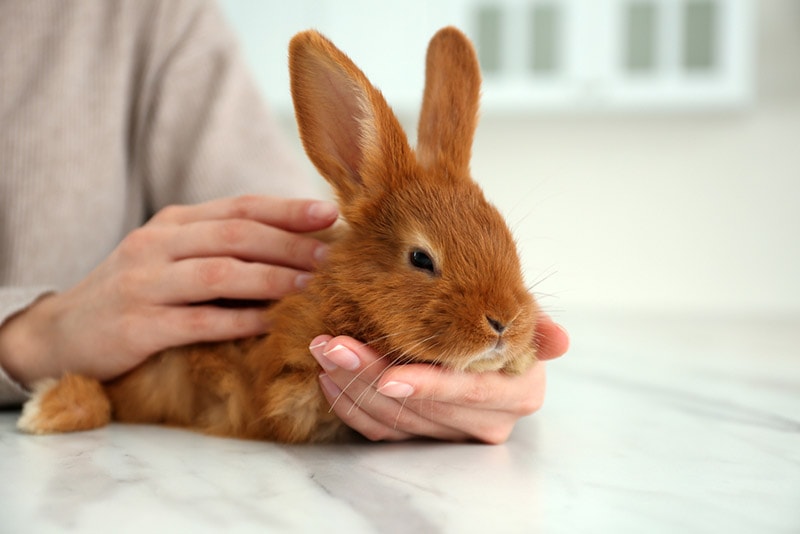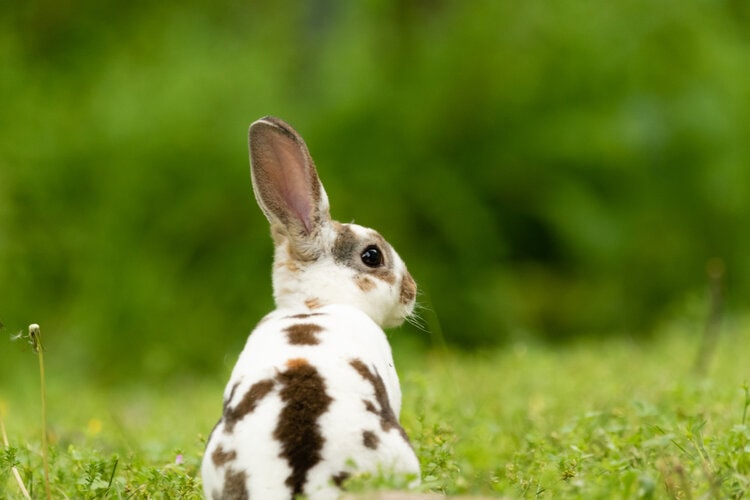Deilenaar Rabbit: Pictures, Care Guide, Lifespan & Traits
By Beth Crane
Updated on

The Deilenaar rabbit is an elusive and exceedingly rare breed, and it’s tricky to locate information about it. The Deilenaar is primarily found in Europe, where it is most popular. These special rabbits have beautiful colors and a spring in their step, so it’s a shame they don’t have more well-deserved recognition. Read on to discover more about the rare breed and how it came to have such wonderfully colored fur.
| Size: | Medium |
| Weight: | Up to 7.5 pounds |
| Lifespan: | Up to 9 years |
| Similar Breeds: | Belgian Hare, Chinchilla, New Zealand Red |
| Suitable for: | Experienced rabbit owners, families with older children, families with space to accommodate a medium-sized rabbit |
| Temperament: | Spirited, open, friendly, hardy |
The Deilenaar’s past is as murky as its present is mysterious. It seems that no one knows precisely how the breed came to be, but sources point to one man (dubbed “the godfather of the Deilenaar”) being the person who created the breed: the late G.W.A. Ridderhof.1
Ridderhof first created the breed in 1936 in the Dutch town of Deil, which gave the rabbit its name. The Deilenaar is a rich mix of species, including the Chinchilla, Belgian Hare, New Zealand Red, Tan, and even a small Flemish Giant. This breeding produced a hardy rabbit with a beautiful, ticked coat and a lively, loving nature.
Deilenaar Rabbit Characteristics
How Much Do These Rabbits Cost?
Because the Deilenaar is so rare, it’s likely that finding and purchasing one is a difficult and costly affair. Unfortunately, their rarity means they’ll come in at a high price point, potentially in the hundreds. As a comparison, the rare (but still easily found) Silver Fox rabbit can cost from $80 for a young female (doe) and $100 plus for a breeding pair.
If you want to find a Deilenaar, your best bet is to look for a rare rabbit breeder (likely in Europe or the UK). They can be found on social media or through the British Rabbit Council’s breeders list. However you find your Deilenaar breeder, make sure you carefully scrutinize them and look for reviews to ensure they are reputable.
Temperament & Intelligence of the Deilenaar Rabbit
The Deilenaar is described as a lively rabbit with an open and friendly personality, making them a good choice for owners with previous rabbit-owning experience. Rabbits are intelligent creatures that can be trained to use a litter box, stand in a certain way for shows or care procedures (like nail clips), and even do tricks!
The Deilenaar is no exception, but you might have difficulty keeping their attention due to their lively nature. Energetic rabbits need lots of space to keep them happy. Because they’re intelligent, they may become bored if stimulation isn’t provided. A Deilenaar will need plenty of toys to keep them occupied.
Do These Rabbits Make Good Pets?👪
The Deilenaar is described as a loving and friendly rabbit with an energetic side. It has a great mix of traits for rabbit owners familiar with the needs of a “running” rabbit but not so much for novice owners. Rabbits that can’t expend the energy they need may turn to destructive or harmful behavior such as excessive chewing, so owners with experience handling energetic rabbits are best. They will likely be happy to interact with their owners, but the Deilenaar won’t suit owners who want a rabbit content to relax all day!
Does This Rabbit Get Along With Other Pets?
Because rabbits are social animals, the friendly Deilenaar will likely get along well with other rabbits. In fact, all rabbits need to be kept with at least one other rabbit for their health and welfare. They live in large social groups in the wild and are happiest as pets when they have company. In addition, rabbits can get very stressed when they don’t have roommates, which can lead to physical health problems.
If a Deilenaar is well socialized to other pets as a young rabbit, it will happily live with other animals in the home. They aren’t known to be territorial and aren’t aggressive. It’s important to note that you shouldn’t leave a cat or dog alone with a rabbit, but they can form close friendships if each pet is well-socialized when young.
Things to Know When Owning a Deilenaar Rabbit
Food & Diet Requirements🥕
The Deilenaar will need the correct diet to keep them healthy and happy. Rabbits are herbivores with constantly growing teeth, so there are elements to their diets that should always be provided to prevent dental and gastrointestinal problems from developing. Rabbits need a constant supply of hay to help them keep their teeth in shape. You can never give them enough; rabbits will constantly chew on the hay to grind down their incisors and molars, keeping them sharp and at the correct length.
Hay, such as Timothy hay, should make up most of your Deilenaar’s diet, and they should be given a small amount of high-quality pelleted rabbit food daily. Don’t give them muesli-type food since it can lead to your Deilenaar only eating the bits they like (selective feeding).
Of course, every rabbit will love a treat now and again, and your Deilenaar can enjoy a daily supply of leafy green vegetables in addition to their pellets and hay. It’s best to avoid serving starchy vegetables daily (like carrots or potatoes); instead, keep these veggies as a one-off treat on occasion. Variety is the key, but make sure any new greens you introduce to your Deilenaar don’t cause problems such as diarrhea or gas.
- Cilantro
- Mustard Greens
- Bok Choy
- Beet Greens
- Watercress
Fruit can be given occasionally and in small portions (one to two teaspoons). Fruits such as apples and pears are good choices, but too much can cause dental and gastrointestinal problems.
Habitat & Hutch Requirements🏠
All rabbits need a suitable place to live, including the Deilenaar. They are a very energetic breed, requiring plenty of room to run about and play. Because of that, it’s best to dedicate a room in your home for your rabbit to call their own.
Rabbit-proofing the room is vital, and your Deilenaar will want to explore everything when they feel comfortable. Rabbits are renowned for chewing, so remove anything that could hurt them, such as wires and sharp objects. You’ll need to provide hay in the room for your Deilenaar and a litter box, so it’s best to choose a space away from other animals.
They will need a large cage they can nest in when they need to rest, which should be large enough for them to turn around and stand up without their ears touching the roof. Ensure the cage has a litter box inside, a water bottle, and plenty of hay for them to curl up in. Rabbits should be able to go outside for supervised exploration, but your Deilenaar should not be kept outside.
Exercise & Sleeping Needs🐇
If you dedicate a room for your Deilenaar, it should be able to come out of its cage and play in it for extended periods under your supervision. These are lively rabbits with lots of energy to expend, so allowing them the time to play and run will keep them happy. Toys are essential to a rabbit’s development and happiness, and the Deilenaar is bound to love running, hopping, and jumping over tunnels and into boxes! Rabbit toys can be bought or made, and many rabbits, like cats, enjoy playing with balls of paper. Make sure any toys you buy are suitable for medium rabbits, and keep an eye out for any wear and tear as a sign to replace them.
Your Deilenaar will need a quiet and dark place to sleep in, so try to choose a room that’s not in the center of the home. Darkness is important so your rabbit can rest, but they also need to be allowed a period of natural sunlight.
Training 🥎
Deilenaar rabbits can be trained to do various things, like using a litter box. Rabbits are intelligent and clean creatures, so litter tray training usually comes naturally to them. Not only can they use the potty, but your Deilenaar will be able to run agility courses or learn to walk on a leash if given enough time and encouragement. In addition, rabbits can learn to come when called, jump into a carrier, and even fetch.
It’s best to use treats when training; your Deilenaar will love nothing more than a good training session followed by a treat at the end. Be patient and encouraging, but never shout at or hit them. Rabbits are delicate creatures that can be hurt easily, and yelling or hitting them will only make them very afraid of you.
Grooming✂️
The Deilenaar has lustrous fur that’s medium short and non-fluffy, and it’s skilled at keeping it spick and span, as most short-haired rabbits are. You can groom them with a soft, rabbit-sized curry brush once a week to relax them and check their skin for any signs of problems, but they don’t need regular grooming as some long-haired rabbits do.
Rabbits typically don’t like water, so they won’t need bathing unless directed by a vet. Clipping your Deilenaar’s nails will be an essential part of their care, and getting them used to the procedure as soon as you bring them home is important. Training your Deilenaar to sit still for a nail clipping will benefit you in the future, as some rabbits’ nails grow quickly and will need trimming once a month.
Lifespan and Health Conditions🏥
There is limited information on the Deilenaar’s lifespan or if they have any specific health conditions they are more inclined to suffer from. There are specific problems that all rabbits can face, which we will cover below.
- Fleas
- Ear Mites
- Dental Disease
- Gut Stasis
 Male vs Female
Male vs Female
There aren’t many behavioral differences between a male and a female Deilenaar rabbit. Unless you looked at their genitals for sexing purposes, it’d be tough to tell the difference by looks alone! Some female rabbits also have a pronounced dewlap, which is a pouch of fat under the chin. Because the Deilenaar doesn’t have much of a dewlap, sexing them is even more difficult.
Female rabbits of all types have more pronounced genitals than males, which look like a small pyramid. Males have two long testicles on either side of their penis. Apart from that, there aren’t any visual differences.
Make sure you have your Deilenaars sexed by a veterinarian before they reach four months (the age of sexual maturity) if they haven’t already, as leaving a male and a female together will soon result in several baby bunnies running around!
The 3 Little-Known Facts About Deilenaar Rabbit
1. They Originated in a Dutch Village
Deil, the village that gives the Deilenaar its name, is a small village in the center of the Netherlands.
2. World War II Affected the Deilenaar
Despite the Deilenaar being recognized as a breed in the Netherlands in 1940, the invasion of the Netherlands and WWII made the spread of this breed very slow across Europe. The species reached Germany in 1975.
3. It Is a Fairly Recent Breed to Britain
Because of the time it took for the Deilenaar to reach Western Europe, it wasn’t introduced to Britain until at least 1980. The British Rabbit Council, the body that governs rabbit showing in the UK, did not formally recognize the breed until the late 1980s. The British breed standard is similar to that of the Dutch.
Final Thoughts
The Deilenaar is an extraordinary breed that has almost faded into obscurity. There are very few breeders of the Deilenaar, but the breed is beloved and cherished among its small fan base. The beautiful russet colors of the Deilenaar’s coat and its lively but loving temperament are adored, and perhaps the breed will become more popular in the future. As it stands, the Deilenaar is not recognized by the American Rabbit Breeders Association (ARBA) but is recognized by British, German, and Dutch groups.
Related Read:
- Fauve De Bourgogne Rabbit Pictures, Care Guide, Lifespan & Traits
- Golden Glavcot Rabbit: Info, Care, Diet, Pictures & More
Featured Image Credit to: felberwolf, Pixabay











